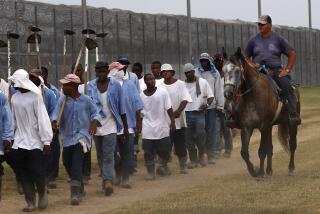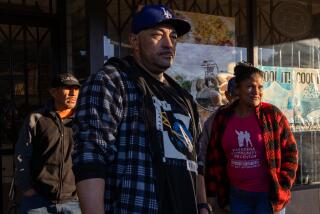Slavery Tradition Dies Hard in Rural Brazil Despite Crackdown : Economy: 107 years after it was officially banned, forced labor still ensnares thousands.
- Share via
RIBAS DO RIO PARDO, Brazil — Father Alfeo Prandel was out in his Volkswagen, driving sandy rural roads, looking for slaves.
He stopped near a battery of charcoal ovens, like big beehives, where four young men were taking a break from work. They said they had been brought a long distance, in a truck, to the western state of Mato Grosso do Sul from the state of Minas Gerais two months ago to make charcoal from eucalyptus trees that grow in plantations covering a million acres here.
It is hard, hot work, dawn to dusk. The men said they were promised attractive salaries but grew suspicious later when they learned that payday would come only after 90 days.
“Since we came from Minas Gerais, we haven’t seen the color of money,” one of them said. They get food and provisions from a country store on credit against future pay, he said. “We buy, and they keep discounting.”
They told Prandel they were worried about whether they would receive any cash after all the deductions. Prandel, 52, told them they had good cause for concern.
Those four men, he said later, have started down a path that often leads to conditions of slave labor in this and other remote parts of rural Brazil.
Workers, desperately poor and often illiterate, are taken far from their homes for jobs that pay less than their expenses, which often include charges for the move and for tools to work with. Indebted, isolated and intimidated, some end up working years for nothing, unable to quit and afraid to flee, said Prandel.
Brazil’s economy, among the world’s 10 biggest, provides millions of industrial jobs, offers succulent executive salaries and even produces a few billionaires. But in this nation’s backwaters, thousands of rural workers are virtual slaves, according to government and human rights officials.
“It’s serious, very serious in Brazil,” said James Cavallaro, a representative in Brazil of Human Rights Watch and Americas Watch. A commission of the Roman Catholic Church in Brazil reported the exploitation of 25,000 people under indentured servitude or debt bondage last year.
A congressional committee concluded after an investigation in 1994 that “slave or forced labor is a reality in our country.” President Fernando Henrique Cardoso has ordered a crackdown on slave labor, which was officially abolished in 1888.
“There are still Brazilians who work without liberty,” Cardoso said in a recent radio speech.
In Cardoso’s Labor Ministry, Ruth Vilela has begun a drive to enforce Article 129 of Brazil’s labor code, which makes reducing a worker “to a condition analogous to a slave” a crime punishable by up to eight years in prison.
As secretary of inspection, Vilela has created five specially trained teams to look for slave labor conditions. Three more teams will be added by the end of the year, she said in her Brasilia office.
Not all reports of slavery are verified, she said, but “inspectors have found actual slave labor and labor under degrading and subhuman conditions.”
In July, Vilela went with a Labor Ministry team to raid a remote ranch near the town of Vila Rica in northern Mato Grosso state. They found 33 people, hired to clear forest for pasture, working under the supervision of armed guards.
She said one of the workers had fled the ranch, “but he was brought back and beaten.”
The three armed supervisors were middlemen called gatos , or cats. Familiar figures in rural Brazil, gatos are relied upon by many ranchers to recruit cheap labor and see that the work gets done.
Vilela said that the three gatos were arrested and charged under Article 129, but that a judge later released two of them because it was their first offense. She said local labor courts, state police and even Labor Ministry inspectors are often influenced by landowners, making it hard to prosecute cases of slavery.
“The police even take it upon themselves to hunt down fugitives and return them to the ranch, probably receiving a [reward],” she said. “It’s horrible. The workers have no hope of any improvement. They struggle to survive.”
The root of the problem, Vilela said, is rural poverty. Outside industrial centers such as Sao Paulo, Rio de Janeiro and Belo Horizonte, Brazil has some of the deepest poverty in South America.
Landowners use gatos because “they understand that is the system, that it always worked that way and always will,” Vilela said. “That is their culture.”
Ranchers who use slave labor on their land may also use dish antennas, faxes and light planes, she said. “How can they be able to absorb all of that modern luxury and not be able to absorb basic questions of labor rights?” she wondered.
Some social observers suggest that illegal slave labor is a throwback to the days when slavery was legal in Brazil and that the attitudes and culture behind the institution have endured in backward areas.
Others argue that modern economic realities, such as the nation’s need to export products at competitive prices, encourage slave-like conditions at the beginning of the production chain. Charcoal ovens, for example, produce fuel for Brazil’s steel industry, which exports to the United States.
Vania Aragao, a professor of social services at the Dom Bosco University in Mato Grosso do Sul, said conditions of slavery also are the result of a society that excludes many of its people from education, health care and civic participation. “It is a historical exclusion,” she said.
Land has always been concentrated in the hands of a few while millions of landless peasants are left looking for work wherever they can find it. The mechanization of agriculture in parts of Brazil during recent decades has tightened the squeeze on rural workers.
Aragao, who is on a sabbatical to study labor conditions in rural Mato Grosso do Sul, said people who work in conditions of slavery do so because they have no choice. “It is a survival strategy,” she said. “If they don’t do it, they will die of hunger.”
Aragao and Father Prandel, a Catholic priest in the Redemptorist order, are members of a group formed in Mato Grosso do Sul two years ago to combat slave labor. They were out together checking conditions at charcoal ovens on a recent Friday, but they found no one who said he was being forced to work off a debt without payment in cash.
Acionides Rocha, 32, said he has been clearing about $200 for every three months worked since late 1994. Reinaldo Missaia, 35, said payday had been delayed a few days but that he was due to receive $200 in cash for his first 90 days of work after deductions for food and other expenses.
Missaia said he would like to go home to Minas Gerais but probably would stay. “We don’t really like it here, but since we’re a long way from home, we are obligated to like it,” he said as he loaded eucalyptus logs into an oven.
Prandel said his commission, government inspections and publicity have caused oven owners and gatos to take more precautions lately in exploiting cheap labor. “When there was no inspection, the situation was much more visible,” he said. “They have learned to camouflage it.”
When the commission first began coming to the area, he said, “it was a situation of real slavery. . . . Gatos went around on motorcycles overseeing everything, and they were armed.”
In 1994, federal police and labor inspectors raided 400 ovens about four miles from Ribas do Rio Pardo. Prandel said they found many workers in conditions of slavery but that the company that owned the ovens got off with a fine.
Prandel said the commission was peeved. “If Brazil wanted to, if it had the political will, this would be stopped,” he said.
More to Read
Sign up for Essential California
The most important California stories and recommendations in your inbox every morning.
You may occasionally receive promotional content from the Los Angeles Times.










